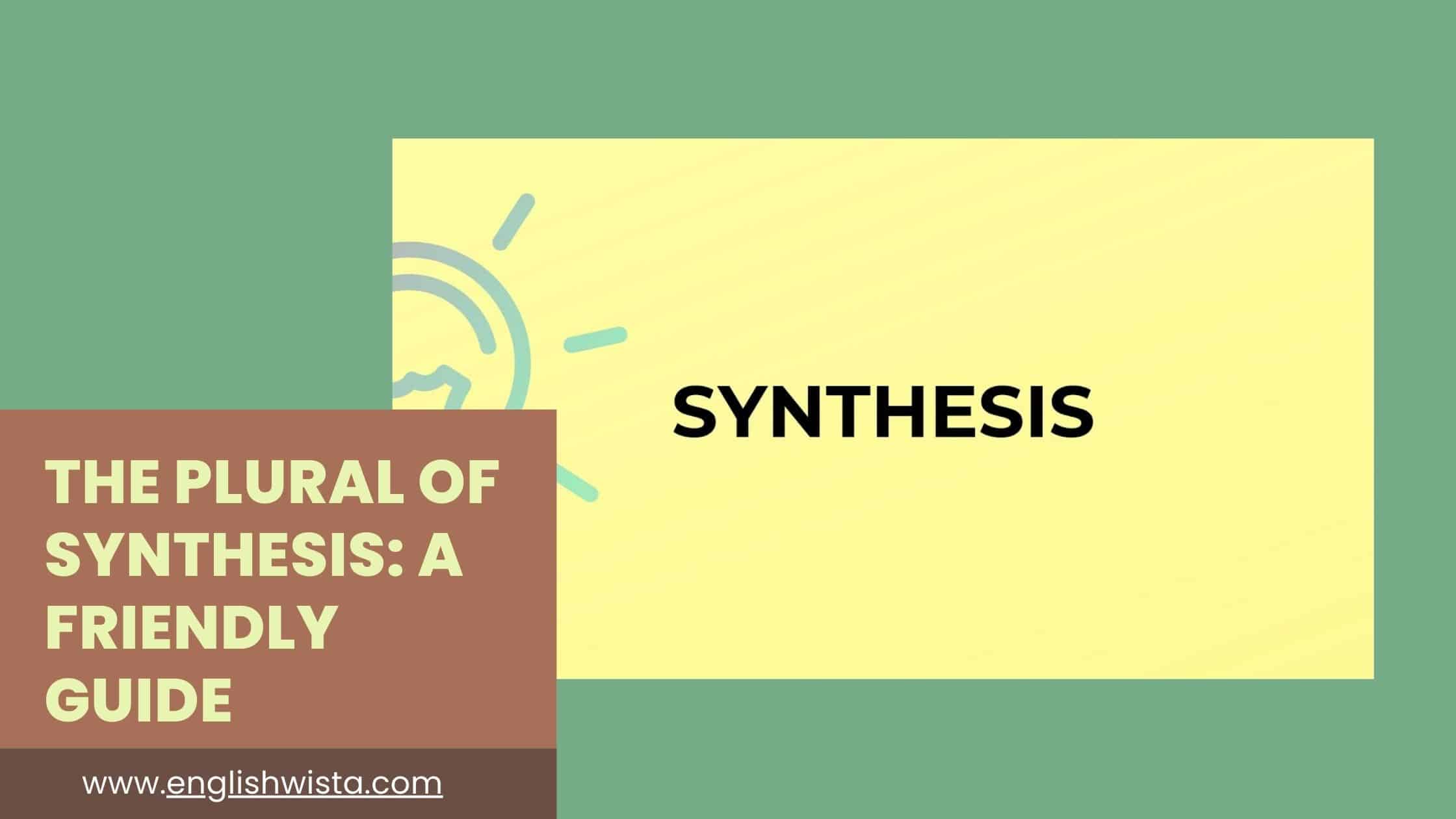Have you ever come across the word “synthesis” and wondered what its plural form should be? You are not alone! Words that come from Greek or Latin roots often confuse people when it comes to forming their plurals. They don’t always follow the simple rule of just adding “s” or “es.”
The word synthesis is one of those tricky words. At first glance, you might be tempted to say synthesises or synthesiseses, but that doesn’t sound quite right, does it? In this article, we’re going to explore the plural of synthesis, learn how to use it correctly, and see lots of examples to make everything crystal clear.
So, grab a cup of tea or coffee, sit back, and let’s unravel this mystery step by step in a fun and easy way.
What Does “Synthesis” Mean?
Before we jump into plurals, let’s make sure we know what the word synthesis actually means.
- Simple Definition: Synthesis means combining two or more things to form something new.
- Think of it like mixing different ingredients together to make a cake. Each ingredient is important, but when combined, they create something different and often better.
Examples of Synthesis in Action:
- In chemistry, synthesis happens when elements combine to form a compound.
- In writing, synthesis means combining ideas from different sources to form a single, clear argument.
- In music, synthesis can mean blending sounds or using synthesizers to create new tones.
So, no matter the field science, art, or language the idea is the same: putting things together to create something new.
What Is the Plural of Synthesis?
Here’s the direct answer you’ve been waiting for:
The plural of synthesis is “syntheses.”
- Singular: synthesis
- Plural: syntheses
Notice how the ending changes: instead of adding “s,” the -is ending changes to -es.
So when you’re talking about more than one synthesis, you should say syntheses.
Why Isn’t It Just “Synthesises”?
Good question! Most English nouns form their plurals by adding “s” or “es.” For example:
- book → books
- box → boxes
But synthesis is different because it comes from Greek. Many Greek words ending in -is change their plural form to -es.
Here are a few examples to compare:
- analysis → analyses
- basis → bases
- crisis → crises
- thesis → theses
- synthesis → syntheses
So, synthesis follows the same pattern as analysis or thesis. If you already know those words, it becomes easier to remember.
Is “Synthesis” Singular or Plural?
This is a common question. Let’s make it simple:
- Synthesis is singular. You use it when talking about one act or process of combining things.
- Syntheses is plural. You use it when talking about more than one act or process.
Example Sentences:
- “The scientist performed a synthesis of two chemicals.” (one synthesis)
- “The research paper described several syntheses of new materials.” (more than one synthesis)
How to Pronounce “Syntheses”
Sometimes spelling is only half the battle pronunciation can be tricky too!
- Synthesis is pronounced: SIN-thuh-sis.
- Syntheses is pronounced: SIN-thuh-seez.
That “-es” ending in the plural becomes a long “eez” sound. This is just like thesis → theses or analysis → analyses.
Real-Life Examples of “Synthesis” and “Syntheses”
Let’s see how these words appear in real contexts.
In Science:
- “Photosynthesis is the synthesis of food in plants using sunlight.”
- “The chemist conducted multiple syntheses to test different reactions.”
In Writing or Literature:
- “Her essay was a clear synthesis of the two articles.”
- “The teacher asked students to create syntheses of different viewpoints.”
Use In Music:
- “The musician experimented with sound synthesis to create new effects.”
- “Modern electronic music often relies on various syntheses of tones.”
In Everyday Life:
- “Cooking is really a kind of synthesis you mix ingredients to make a meal.”
- “Our group project involved many syntheses of ideas before we reached the final plan.”
These examples show that both the singular and plural forms can be used in many areas of life.
Origin of the Word “Synthesis”
Now for a little fun fact! The word synthesis comes from the Greek word “sýnthesis,” which means “a putting together.”
- “Syn-” means “together.”
- “Thesis” means “a placing” or “arranging.”
So the word literally means “putting together.” That makes perfect sense when we think about the definition today.
Common Mistakes to Avoid
It’s easy to slip up when using synthesis and syntheses. Let’s go over some common mistakes and how to fix them:
- Mistake: Saying “synthesises” as the plural.
- Correction: Always use “syntheses.”
- Mistake: Mixing up singular and plural.
- Correction: Remember: synthesis = one, syntheses = more than one.
- Mistake: Mispronouncing the plural.
- Correction: Say SIN-thuh-seez, not SIN-thuh-sess.
Tips for Remembering the Plural
Here are some easy tricks to help the word stick in your mind:
- Think of similar words: thesis → theses, analysis → analyses, synthesis → syntheses.
- Break it into syllables: syn-the-sis (one), syn-the-sees (many).
- Visualize: Imagine you are “putting together” more than one thing. That’s syntheses.
How Does It Compare to Other Words Ending in “-is”?
To reinforce the idea, let’s quickly compare synthesis to a few other words that follow the same pattern:
- Crisis → Crises
“The country faced one crisis, then several crises.” - Analysis → Analyses
“Her analysis was deep, and the professor praised her multiple analyses.” - Thesis → Theses
“He wrote one thesis in college but read many theses during research.”
These examples all follow the same Greek pattern, so once you learn one, you can remember the others more easily.
Fun Facts About “Synthesis”
Here are a few extras to make learning more enjoyable:
- In chemistry, “organic synthesis” is a huge field. It involves creating new organic compounds that can be used in medicine, plastics, and many other products.
- In music, electronic synthesizers became popular in the 20th century and completely changed how music sounds. Without synthesisers, modern pop, EDM, and movie soundtracks would sound very different.
- In philosophy, synthesis refers to combining different ideas or arguments to reach a more complete understanding. For example, Hegel’s philosophy often talks about “thesis, antithesis, and synthesis.”
Pretty cool, right? The word synthesis is versatile and shows up in many areas of life.
Practice Sentences for You
Here are some extra practice sentences. Try reading them aloud to get comfortable with both forms:
- The teacher asked for a synthesis of the chapter.
- Multiple syntheses were needed to reach a conclusion.
- A single synthesis can change how we understand a problem.
- New syntheses in technology are shaping our future.
- His essay showed a brilliant synthesis of different theories.
- The lab report listed five successful syntheses.
By practicing with sentences like these, you’ll soon use the word naturally and confidently.
Conclusion
So, what have we learned today? Let’s recap:
- Synthesis means combining parts to form a whole.
- The plural of synthesis is “syntheses.”
- It comes from Greek, just like words such as thesis and analysis.
- Pronounce it as SIN-thuh-seez.
- Use synthesis for one and syntheses for more than one.
Next time you’re writing a paper, working in the lab, or even just cooking dinner, you’ll know exactly how to use synthesis and syntheses correctly.
Language can sometimes feel tricky, but with a little practice and some fun examples, even words with unusual plurals become easy to handle. Remember: one synthesis, many syntheses.
And now you’ll never forget it!



